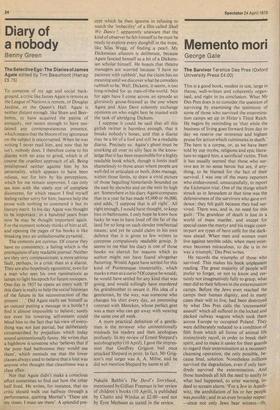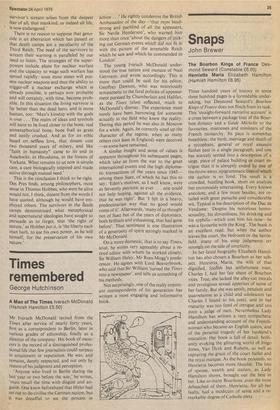Memento mori
George Gale•
The Survivor Terence Des Pres (Oxford University Press £4.00)
This is a good book, modest in size, large in theme, well-written and coherently organised, and right in its conclusion. What Mr Des Pres does is to consider. the question of surviving by examining the testimony of some of those w ho survived the extermination camps set up in Hitler's Third Reich. He begins by reminding us 'that while the business of living goes forward from day to day we reserve our reverence and highest praise for action which culminates in death.' The hero is a corpse, or, as We have been told by our myths, religions and epic literature to regard him, a sacrificial victim. Thus it has usually seemed that those who survive are in no sense heroic but are, if anything, to be blamed for the fact of their survival. I was one of the. many reporters who endeavoured, unsuccessfully, to report the Eichmann trial. One of the things which struck us in Jerusalem at that time was the defensiveness of the survivors who gave evidence: they felt guilt because they had survived. There was, and is, no need for this guilt : `The grandeur of death is lost ,in a world of mass murder, and except for special cases the martyr and his tragic counterpart are types of hero unfit for the darkness ahead. When men and women must live against terrible odds, when mere existence becomes miraculous, to die is in no way a triumph,' Des Pres writes.
He records the triumphs of those who survived. This makes his book unpleasant reading. The great majority of people will prefer to forget, or not to know and certainly not imaginatively fully to grasp, what men did to their fellows in the extermination camps. Before the Jews even reached the camps their human dignity, and in many cases their will to live, had been destroyed by what Des Pres calls the 'excremental assault' which all suffered in the locked and packed railway wagons which took them across Europe to occupied Poland. They were deliberately reduced to a condition of filth from which all forms of animal life instinctively recoil, in order to break their spirit, and to make it easier for their guards to regard their extermination as a necessary cleansing operation, the only possible, because final, solution. Nonetheless millions survived the degradation, even if only hundreds survived the extermination. And those hundreds all felt the need to testify to what had happened, to utter warning, indeed to scream alarm: 'For a Jew in Auschwitz, the annihilation of his or her people was possible; and in an even broader respecl —since not only Jews bear witness—th.
survivor's scream arises from the deepest fear of all, that mankind, or indeed all life, IS now endangered.'
There is no reason to suppose that genocide is an aberration which has passed or that death camps are a peculiarity of the Third Reich. The need of the survivors to scream their warning is paralleled by our need to listen. The strategies of the superpowers include plans for nuclear warfare and the capacity to wage such warfare has spread rapidly: soon most states will possess nuclear weapons and thus the ability to trigger-off a nuclear exchange which is already possible, is perhaps now probable and will certainly, with time, become probable. In this situation the living survivor is fax. better than the dead hero, and is more human, too: 'Man's kinship with the gods is over. . . The realm of ideas and symbols will have to be lived closer to the bone, real unmetaphorical bone, bone frail as grass and easily crushed. And as for an ethic based on selfless love, that dream cost two thousand years of misery, and like "faith in humanity" came to its end in Auschwitz, in Hiroshima, in the forests of Vorkuta. What remains to us now is simple care, a care biologically inSpired and made active through mutual need.'
This is the conclusion I think to be right. Des Pres finds, among, philosophers, most sense in Thomas Hobbes, who were he alive would not, I think, dissent from the words I have quoted, although he would have employed others. The survivors in the death camps demonstrated what metaphysical and supernatural ideologies have sought to persuade us to forget, that 'the right of nature,' as Hobbes put it, is 'the liberty each man hath, to use his own power, as he will himself, for the preservation of his own nature.'



































 Previous page
Previous page